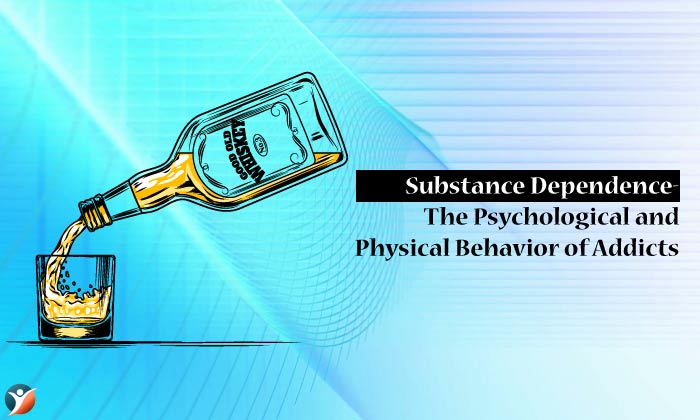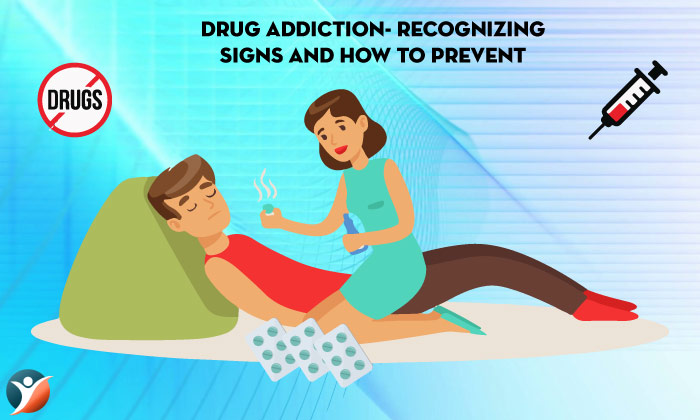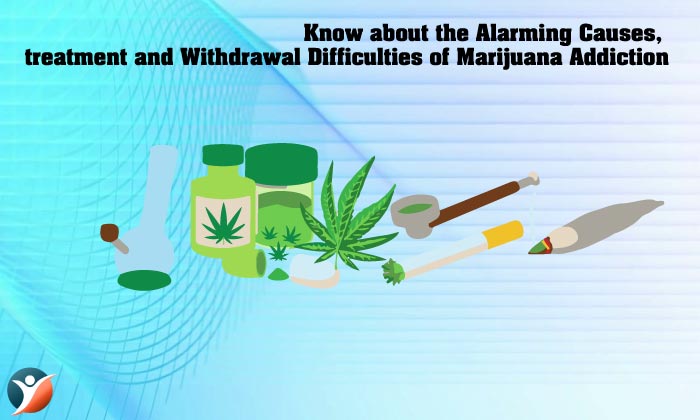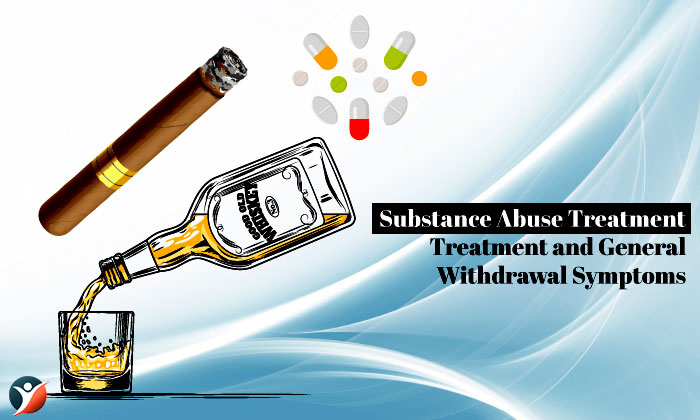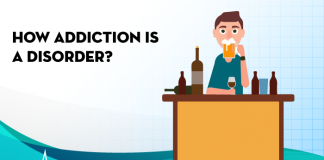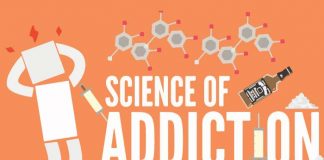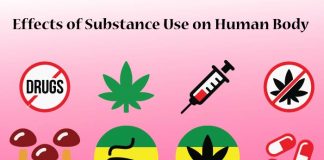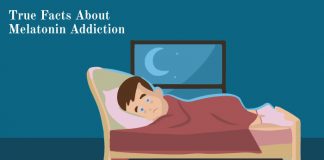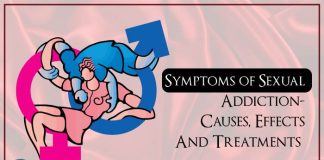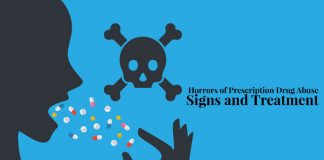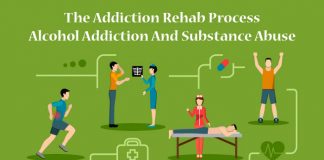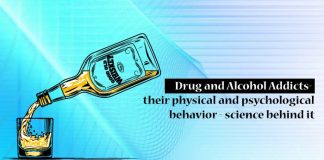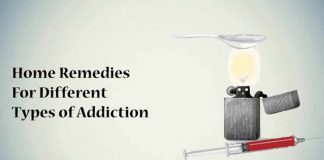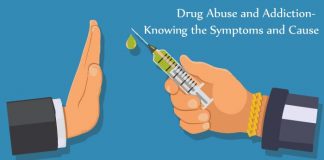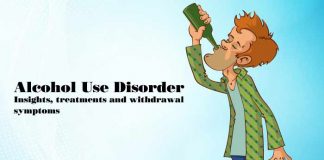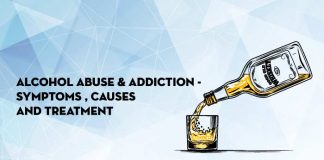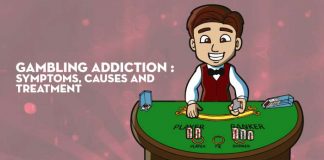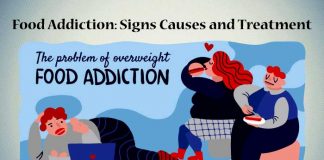
Table of Content
- Overview
- Difference Between Drug Abuse and Addiction
- What Substance and Behavioral Addiction Stats Have to Say?
- Types of Addiction
- Common Signs and Symptoms of Addiction
- The Five Stages of Addiction
- What are the Causes of Addiction?
- Risk Factors of Addiction
- Consequences (Complications) of Addiction
- Addiction Withdrawal Symptoms
- Treatment of Addiction
- Conclusion
Overview
Usually chronic in nature, addiction is a complex brain disorder, which impacts the functioning of the brain as well as the body. This disorder leads to negative alterations in brain areas involved in reward, motivation and memory. In simple words, addiction can be described as psychological or physical need to act, take or utilize certain things to the extent, where the same can prove detrimental to the physical and mental health.
In general people with addiction are unable to control their urge to take or use certain things, or display specific behavior. In this disorder, the patients crave for a substance or behavior, specifically when it includes an obsessive or compulsive desire for reward with complete ignorance of concern about the consequences.
It is not necessary that a person can only develop addiction to physical substances like drugs and alcohol, but to abstract stuffs like gambling or even supposedly harmless things, such as chocolate. Hence, addiction denotes both dependence on substance(s), such as prescription/illicit drug addiction, and behavioral addiction like Internet/gambling addiction.
Usually, an addicted person is expected to possess the following characteristics:
-
- Inability to keep distance from specific substance or cease showing a particular behavior
- Absence of self-control
- Ever increasing longing for any specific substance or behavior
- Disregard how such behavior may impact him/her and people around
- Little to no emotional response
Difference Between Drug Abuse and Addiction
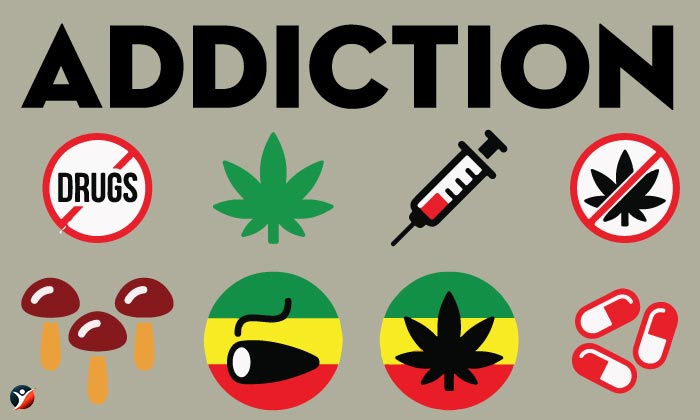
The severity of substance problem, including drugs and alcohol, ranges from mild or moderate to severe.
Drug and alcohol abuse are usually regarded as a mild problem with two to three symptoms of addiction. People with such problem may face serious consequences, such as overdose, crime, accidents, school issues, suicide or violence. However, most people with drug abuse problem may stop using the substance altogether or alter the way they use the same without further developing addiction.
On the other hand, Drug addiction is a severe disease which is chronic in nature. Its treatment is long-term and intensive and requires the use of specialized facility or de-addiction/drug rehabilitation centers
The difference between drug abuse and addiction lies in the criteria specified by the Diagnostic and Statistical Manual of Mental Disorders (DSM) of the American Psychiatric Association (APA), which both the judicial system and doctors follow.
Although, addiction is regarded as much deleterious than drug abuse, the bitter fact is that either of the two can be equally damaging to the sufferer. Hence, timely diagnosis and treatment are necessary.
A person is said to have been suffering from drug abuse, if one or more of the below-given issues have occurred to her/him in the last year:
- Legal issues due to substance abuse or behavior under its influence
- Caused physical harm to others under the influence of any drug
- Sheer inability to compete unavoidable or just necessary tasks at home, school or office, or unable to take responsibilities of any kind
- Continued drug use despite persistent problems due to the same
Whereas, a person can be considered an addict if he/she meets 3 or more criteria of DSM VI over a span of 12 months:
- Beginning of withdrawal symptoms, both psychological and physical, in situations of unavailability of the drug of choice
- Gradual use of even larger amounts of the same drug to bring about the very same intensity of effect as experienced during the initial days of consumption
- Reluctance towards hobbies and activities that the addict once found interesting and engaging
- Keeping oneself away from the company of family and friends
- Multiple unsuccessful attempts to reduce or stop the use of the substance
- Major portion of time in a day spent on arranging the drug, remaining under the effect and recovering from the effect
- Uninterrupted use of the drug or alcohol despite being aware of the ever increasing psychological and physical consequences of the drug use
Note: It is extremely important to understand whether a person is suffering from drug abuse or addiction through proper diagnosis, so as to help him/her get just the right treatment on time.
What Substance and Behavioral Addiction Stats Have to Say?
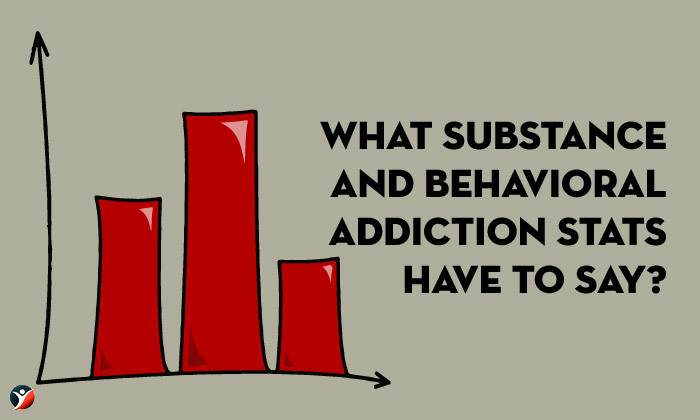
Nearly, 16% of the U.S. population aged 12 or above are known to have substance abuse problem, of which, 9% is contributed by nicotine, 7% by alcohol, 2% by illegal drugs and 1% by prescription drugs [1] According to the U.S. National Institute on Drug Abuse, substance and alcohol abuse is responsible for nearly 740 billion USD annual cost related to crime, health care and lost work productivity.[1]
As of 2013, around 24.6 million Americans, aged 12 years and above, had used some kind of illegal drugs, reflecting an increase of 8.3% from 2002. The 2014 U.S. National Survey on Drug Use and Health depicted that around 1 out of every 6 young adults, aged 18 to 25, were suffering from some substance use disorder.
Likewise, American marijuana users, aged 12 and above, were nearly 19.8 million, showing an increase of 7.5% from 2007. On the other hand, the 2013 stats showed a slight drop in the alcohol dependence among Americans, and similar observations were made in case of tobacco smoking in Americans.[1]
The figures are disturbing for behavioral addictions too. The global prevalence of internet addiction is supposed to be nearly 6.5% with the Middle East having the highest rate (10.9%), and Northern and Eastern Europe the lowest at 2.6%).[1] A population survey in the U.S. and Europe depicted that Internet addiction prevalence rate can be somewhere around 8.2%.
Likewise, according to the U.S. National Council on Problem Gambling, about 1% of the U.S. population (2 million Americans) are suffering from gambling addiction or pathological gambling.
Types of Addiction
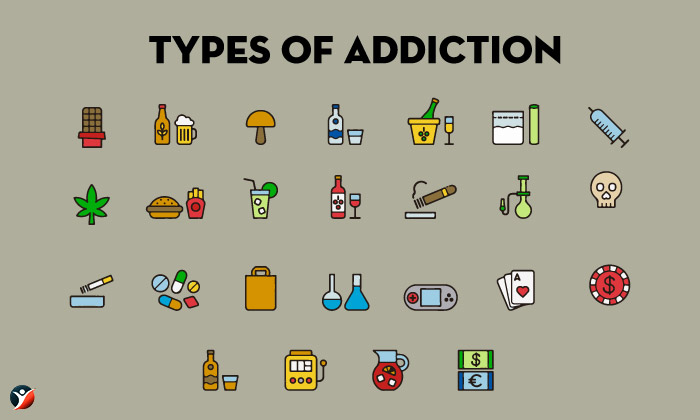
The widely known and serious addictions are found to be associated with drugs and alcohol. Here is a list of substance that have potential to be addictive:
- Alcohol
- Opioids (such as heroin)
- Tobacco
- Cannabis (marijuana)
- Prescription drugs (sedatives, hypnotics, or anxiolytic drugs like tranquilizers and sleeping pills)
- Cocaine
- Hallucinogens
- Amphetamines (such as methamphetamine, called meth)
- Phencyclidine (known as PCP)
- Inhalants
- Other unspecified substances
Besides the commonly known drugs (both prescription and illicit) and alcohol addictions, there are other types of addictions too that a person might develop. These include:
- Internet
- Gambling
- Food
- Sex
- Video games
- Exercise
- Pain (seeking)
- Shopping
- Spiritual obsession (which is not religious devotion)
- Anger (as a coping strategy)
- Caffeine/coffee
- Technology
- Work
However, the American Psychiatric Association (APA) doesn’t regard work, sex and technology addictions as true addictions in its latest edition of DSM.
Common Signs and Symptoms of Addiction
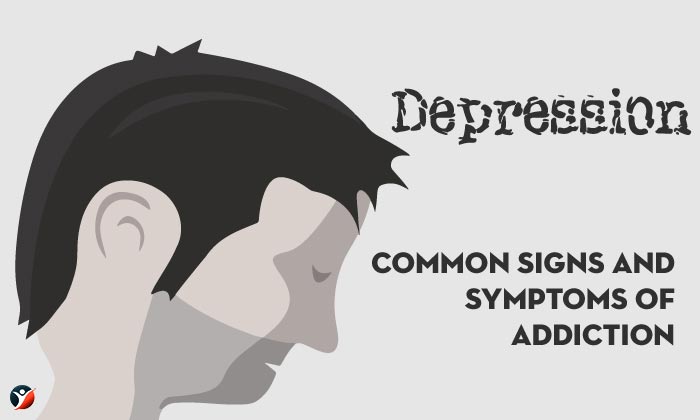
There are some typical signs and symptoms of addiction exhibited by an addict that help in identifying the type and intensity of addiction to some behavior or substance. When looking for addiction in someone close to you, do keep in mind the 3 Cs of addiction:
- Complete loss of control on the quantity and frequency of use
- Unstoppable craving and compulsiveness
- Continued use while being fully aware of the adverse consequences
Apart from these, the signs of addiction are broadly classified as physical, behavioral and emotional. These three are listed below:
Physical Signs of Addiction:
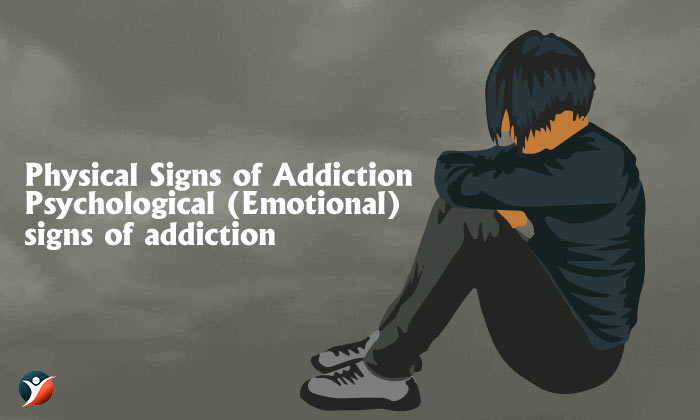
- Being hyperactive or hypoactive, depending on the drug
- Repetitive pattern of speech
- Red eyes, dilated pupils
- Runny nose, but not because of cold, and too much sniffing
- Undernourished or pale appearance
- Weight loss
- Altered eating habits
- Body odor or abnormal odor or because of personal hygiene absence
Behavioral Signs of Addiction:
- School or work absenteeism
- School or work-related issues
- Missing important personal and professional works
- Being secretive about personal activities
- Altered sleep patterns
- Legal issues
- Relationship or marital issues
- Financial issues, such as always in need of money
- Active involvement in conversations after drug use or on topics related to substance to which, the person is addicted
Psychological (Emotional) Signs of Addiction:
- Easily gets irritated and argumentative nature
- Defensiveness
- Unable to cope with stress
- Reluctance towards activities and people that were once interesting
- Unpleasant attitude
- Easily gets confused
- Denial
- Rationalizing attitude – Giving excuses, justifications and even baseless explanations for their addictive behavior
- Minimization – Superficially knowing the issue, but not willing to understand the severity of the behavior or consequences
- Blaming attitude – Putting blame for the behavior on someone else or some situation
- Diversion – changing the topic of discussion to avoid talking about one’s addiction.
The Five Stages of Addiction
Addictions work on your body majorly in 5 consecutive stages. How you body and brain respond to the addictive thing during the initial stages may hugely differ from the those experienced at later stages of the addiction. The following addiction stages are generally observed in a drug or alcohol addicts:
1. Experimentation: Experimenting with some drug or using any drug for the first time is mostly out of curiosity. At this stage, it is nearly impossible to predict whether this experimentation would turn out to be something graver or not. It is necessary to watch out for the intensity and frequency as well as reason of experimentation if someone close to you has recently begun experimenting with any addictive substance.
2. Regular Use: This is the stage when a person make substance abuse a part of his/her daily life. During this stage, the person can willfully anytime stop using the drug in this stage, but the likelihood of developing the dependence is maximum.
3. Risky Use: It is indeed difficult to determine as the definition of risky differs from person to person. In other words, what is risky for one might not be the same for others. Nevertheless, you will still be able to observe behavioral changes in that person. It is important to recognize the initial symptoms so as to prevent further worsening of the condition. Symptoms may include craving, mild symptoms of depression, fatigue and irritability.
4. Dependency: Once an individual develops dependence on drug or alcohol, his body as well as mind are under the control of that substance. Severe behavioral changes occur during this stage that can be detrimental to the health of the abuser. Appropriate treatment can help a person do away with the drug dependency in this stage.
5. Addiction: The persistent substance abuse will ultimately result in drug/alcohol addiction. Addiction is the severe case of drug abuse, where long-term, professional treatment and care are required.
What are the Causes of Addiction?
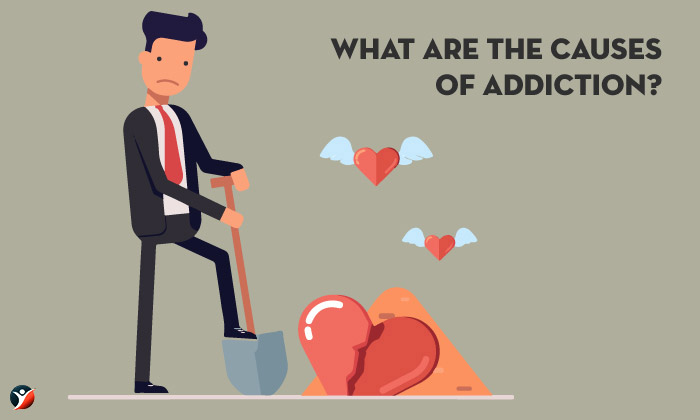
A pleasure-imparting ‘high’ effect is created by the addictive substance, which affects the person both physically and psychologically. Scientists assert that a link exists between repetitive use of certain substance or indulgence in specific behaviors, and how the brain experiences the pleasurable effect.
With time, as the body and brain get used to the substance, a person tends to increase the use of that particular substance or involvement in some behavior to bring about the same level of ‘high’ effect. This pattern worsens gradually, and over time, it becomes extremely difficult to overcome the addiction.
Involvement of Brain:
It is observed that a few people may try certain substances or behaviors, but can easily control the urge to involve in them again. At the same time, some people may develop addiction of those things or behavior over time. The frontal lobes of the brain can be partly blamed for it, as these areas delay the feeling of reward. When a person suffers from addiction, these areas tend to malfunction, leading to instant gratification.
Besides, the nucleus accumbens and anterior cingulate cortex too have roles to play in addiction since these regions are involved in generating the feeling of pleasure and may enhance the response of an addict to a particular substance or behavior.
Chemical imbalances inside the brain along with mental disorders like bipolar disorder and schizophrenia can pe probable causes behind addiction. Coping strategies developed due to disorders may turn eventually into an addiction.
Exposure at an Early Stage:
Scientists believe that early and repetitive exposure to addictive behavior or substance can increase the likelihood of developing addiction. By as high as 50%, genetics also enhances the chance of a person of becoming an addict.[1] However, that doesn’t mean that a person will essentially develop addiction if he/she has a family history of the same.
Environmental and cultural factors cannot be neglected when it comes to addiction. Disrupted social support along with traumatic experiences, affecting coping skills, can also be responsible for addictive behaviors in people.
Risk Factors of Addiction
Like other diseases, there are several factors that increase the likelihood of developing an addiction to a specific substance or behavior. Addiction doesn’t depend on age, gender and social status, but there are several other factors that increase its chances. These are:
- Genetics: Family history of addiction can up your risk. Someone with a close relative suffering from addiction is more likely to develop addiction.
However, many experts suggest that situational and environmental factors – common among close family members – contribute to increased risk of addiction. For instance, people with alcohol addiction have 6 times more possibility to have blood-relative, who is suffering from alcohol dependence.
Some geneticists also believe that genes are to blamed for why some people don’t get addicted to cigarettes even after trying a few when there are some, who easily get addicted to cigarettes.
-
- Gender: The U.S-based Mayo Clinic says that men are twice likely to develop addiction than females. And, for this reason, remarkably more males are addicted to some substance or other when compared with their female counterparts.
- Mental Disorder/Condition: Those suffering from mental disorders like ADHD, depression and anxiety are at a greater risk of developing addiction, especially to alcohol, drugs and nicotine.
- Family Attitude: People, who are less attached to their family members, including siblings and parents, have more chances of becoming an addict than those, who share a strong bond with their family.
- Peer Pressure: This is a leading risk factors among the youth. In a bid to ensure their acceptance by a specific group or an attempt to go by the rules of some community, people get encouraged to use substance or indulge in behavior that can be addictive.
- Loneliness: Use of any substance as a coping strategy by people to overcome loneliness and feeling of being alone can increase the likelihood of developing addiction to that same.
- Age of First Use: Research suggests that early exposure to certain substances or behaviors can enhance your risk of developing addiction.
- Nature of Substance: Some substances, including heroine, crack and cocaine have a tendency to develop addiction in their users more quickly than other things like alcohol. Also, just a one-time use a substance can initiate addiction in some people.
- Stress: A stressed person is more likely to cope with his/her situation by using certain substance, which increases his/her risk of developing an addiction for the same.
- Metabolism of the Substance: How a body responds to some substance and metabolize it, ups the chance of developing an addiction for that substance. For example, in case of alcohol, continuous use of alcohol might lead a person to increase the amount of its consumption to experience the same effect. This eventually boosts the risk of becoming an addict.
Consequences (Complications) of Addiction
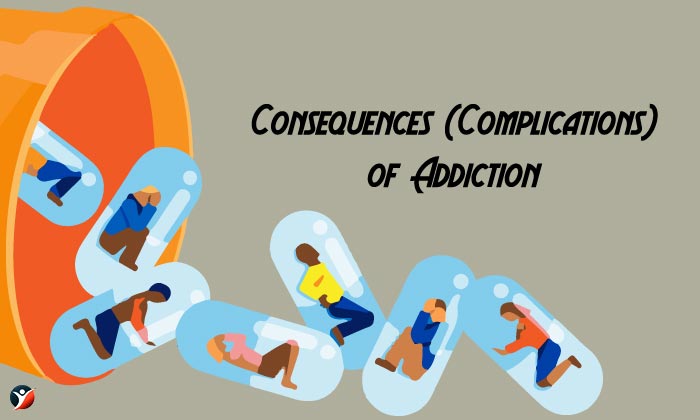
Addiction can severely take a toll on your life. Any addiction, particularly substance addiction can be harmful to an addict in the following ways:
-
- Physical and Mental Health Deterioration: Health gets seriously affected by any type of addiction, be it behavioral or substance related. In case of drugs and alcohol, the health-specific consequences can be mental as well physical, whereas nicotine addiction is known to have physical health-related consequences only.
- Other Disorders: Use of injectable drugs puts an addict at a high risk of contracting hepatitis and HIV/AIDS if he/she shares needle with others. Moreover, use of several substance may let you indulge in risky or unprotected sexual behavior; thereby, increasing the likelihood of getting sexually transmitted diseases (STDs) like syphilis and gonorrhea.
- Accidental Injury/Death: Addicted people are at a higher risk of driving recklessly under the influence or experiencing falls and slips.
- Suicide: Severe drug dependence and even behavioral addictions raise the risk of suicide attempts or developing suicidal tendency in an addict.
- Unemployment, Homelessness and Poverty: Unstoppable urge for substance use makes a person to spend more and more money on the addictive substance, eventually, leading to poverty. Homelessness and unemployment can be subsequent repercussions of being a long-time addict.
- Law-Related Issues: Being addicted to an expensive or illicit drug, which is not easily available, may lead the addict to rely on committing crime like stealing or theft to ensure regular supply of the substance to which, he/she is addicted. This make them more prone to experience legal issues and even imprisonment.
- Child Abuse/Neglect: Child abuse and neglect cases are way more prevalent in families, in which, either or both the parents suffer from some kind of addiction.
- Unconsciousness, Coma or Death: Any of these usually occurs in case of drug overdose, or if two or more substances are taken in combination.
- Relationship Issues: Marital, family and social relations get severely hampered due to addiction, which could result in family breakups, divorce and more.
Addiction Withdrawal Symptoms
Withdrawal is basically the process of completely quitting or cutting down on addictive substances like dugs and alcohol, or addictive behavior, such as Internet or gambling. On withdrawal, an addict may respond in several ways by exhibiting various physchological and physical symptoms; collectively termed as withdrawal symptoms.
Withdrawal symptoms may vary from addict to addict. The intensity of the symptoms usually ranges from mild to severe to even fatal, depending on:
- The type of addictive substance or behavior and for how low it has been in use
- Age of the addicted person along with its physical and psychological features
- Method of withdrawal
In substance as well as behavioral addiction, withdrawal symptoms can be emotional and/or physical. Discussed below are both the types of symptoms:
Emotional and Mental Withdrawal Symptoms:
- Anxiety: panic attacks, anxiety, restlessness and irritability
- Sleep: difficulty in falling asleep, staying asleep for long and insomnia
- Depression: Lack of interest in otherwise interesting things, poor appetite, fatigue and social isolation
- Cognitive: poor memory and poor attention
Physical Withdrawal Symptoms:
- Head: Dizziness and headaches
- Muscles: Muscle tension, twitches, shakes, tremors and muscle ache
- Heart: skipped heart beats, racing heart and palpitations
- Gastrointestinal(GI): Vomiting, nausea, diarrhea and stomach ache
- Chest: Difficulty breathing and tightness in the chest
- Skin: Tingling sensation and sweating
Among all the symptoms tranquilizers and alcohol are responsible for gravest symptoms, such as:
These risk of aforementioned symptoms can be minimized with the help of recommended detox therapy under professional supervision.
The process of withdrawal is divided into two phases: acute and post-acute. The initial phase lasts for around several weeks of withdrawal, during which, an addict can experience physical symptoms, depending on the type of behavioral or substance addiction.
Post-Acute Withdrawal Syndrome:
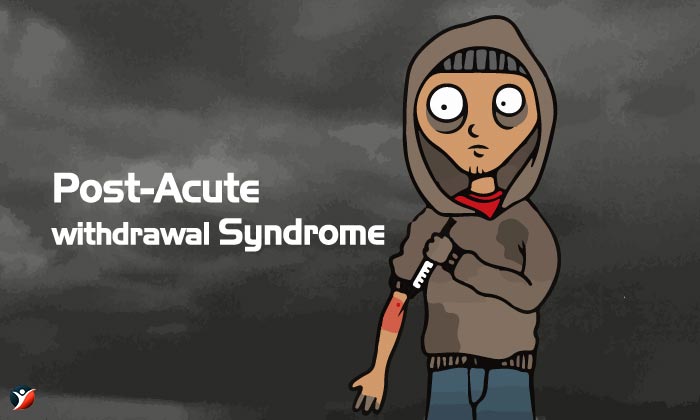
The second phase of withdrawal is known as post-acute withdrawal syndrome (PAWS), where an addict experiences much lesser physical symptoms with too many mental or emotional symptoms. While the first phase symptoms significantly differ from person to person, PAWS symptoms are more or less similar. The common symptoms of PAWS are:
- Low energy levels, tiredness and lack of enthusiasm
- Disrupted sleep patterns
- Anxiety, frequent mood swings and irritability
- Altered level of concentration
Unlike, acute phase symptoms, post-acute symptoms are not persistent, and come with lots of uncertainties. They may frequently switch from one to another in minutes, and even a particular symptom may frequently come and go. It is also quite possible that a specific symptoms may completely disappear for weeks or months, only to reappear later. However, in general, PAWS symptoms last for only a couple of days.
Strategies like being patient and calm, accepting and trying to cope with one’s situation and self-care techniques might help you survival through this phase.
Treatment of Addiction
The goal of any addiction treatment approach is to make an addict sober and prevent future relapses. The treatment program may vary from an addict to addict, which hugely depends on the situation and requirements of the patient.
Needless to say, overcoming addiction and the path of recovery from the same is not at all easy. It needs strong will power and self-determination to strictly adhere to the prescribed treatment for successful outcomes.
Types of Addiction Treatment Choices:
The following types of treatment choices for addiction are available:
Inpatient Rehabilitation: Covering all the aspects of the addiction, a well-structured treatment program is followed in this type of treatment, wherein the patient is made to reside in a specialized facility with no access to any type of substance. The patient here is kept under 24-hour medical supervision and support. This type of treatment is best suited for those suffering from severe or chronic addiction (usually associated with substance abuse) along with the ones, who also have some comorbid mental conditions.
Outpatient Rehabilitation: This is somewhat similar to inpatient rehab as nearly the same treatments and therapies are included in extensive treatment programs. The only difference is that instead of a specialized facility, the patient here is allowed to stay freely at home.
Outpatient rehab program also gives the liberty to work and take care of the family, and the patient just needs to religiously attend pre-scheduled sessions all across the week or months.
However, it is important to known that the liberty to stay at home during outpatient rehab can easily expose a recovering addict to triggers that might pose a challenge to his/her sobriety. Hence, this treatment is ideal for people with mild type of addiction or someone with high level of commitment and strict self-disciplinary attitude.
Types of Addiction Treatment:
Detoxification and Medications:
This helps people survive through withdrawal phase in a safe way till the time no traces of the addictive substance remains in the body system. It is usually considered as the first line of treatment for people with mild to severe forms of addiction.
Some cases of detoxification may require the use of medications too in order to subside withdrawal symptoms. In general, the dose of these medications are gradually reduced and stopped altogether when it is found that the patient has completely no physical dependence on drug or behavior.
To manage different withdrawal symptoms, doctors prescribe different medications during detox. These may include:
- Benzodiazepines: This is for irritability and anxiety. Anxiety is one of the common symptoms of withdrawal from alcohol and drugs like opiates and cocaine. Even benzodiazepines are addictive, hence doctors prescribe it with caution.
- Antidepressants: An addict is rendered incapable of producing natural quantities of happiness-bringing neurochemicals by the addictive drug, and can only be feel good under the influence of the substance in use. It is for this reason, people undergoing detox feel depressed. Thus, the patients are prescribed antidepressants until their natural ability to produce ample amounts of such neurochemicals gets restored.
- Clonidine: It helps alleviate withdrawal symptoms, such as anxiety, muscle cramps, sweating cramps and more.
Biofeedback Therapy for Addiction:
This helps the patient under treatment to have better control on his/her mind and body. Biofeedback therapy identifies the way the body unconsciously reacts to emotional and physical stress.
Withdrawal symptoms, especially in case of substance or alcohol addiction, result in physical stress and too many involuntary responses. A biofeedback machine records the body’s responses to stress, which is then displayed to the recovering addict to let him know what can be done to alleviate the response.
This therapy is found to be effective in treating symptoms like anxiety, restlessness, depression and chronic muscle pain. The following biofeedback exercises can be recommended to overcome manage the symptoms:
- Guided Imagery: This involves allowing the flow of your thoughts in the direction of calming and positive images as well as situations to relieve the body and mind.
- Progressive Muscle Relaxation: It focuses on relieving muscle tension by concentrating over one muscle at a time.
- Mindfulness Meditation: It entails concentrating peacefully to do away with negative thoughts and emotions.
Psychotherapies for Addiction:
1. Cognitive Behavioral Therapy (CBT): This therapy helps patients establish a link between their thoughts and actions and boost their understanding of how these things can affect their recovery. Beside addiction, CBT can be used to treat other comorbid conditions like obsessive compulsive disorder (OCD), bipolar disorder, post-traumatic stress disorder, eating disorder and so on.
2. Dialectical Behavior Therapy (DBT): This type of therapy allows addiction patients develop skills, such as distress tolerance, mindfulness and emotional regulation that can help them overcome the dependency. Strategies generally used in DBT include:
- Assisting patients in finding peer groups and environments that deter the use of substance or indulging in addictive behavior.
- Helping the patients remove triggers like unhealthy relations or situations, wherein they can easily exhibit some addictive behavior or use substance.
- Uplifting self-confidence and self-esteem to maintain sobriety during the time of stress.
3. Experiential Therapy: This therapy is best suited for people, who are not comfortable in a typical counselling setting. This therapy emphasizes on exposing the patient to an environment, where he/she is most comfortable like outdoors, music studio or art gallery.
A patient undergoing this therapy learns how to better overcome negative emotions and past traumatic experiences, while developing skills to cope with real-world stressors without turning back to drugs. This is also used to manage comorbid conditions like depression, anxiety, etc. Experiential therapies may include:
- Recreation therapy
- Sculpting
- Rope courses
- Rock climbing
- Wilderness therapy
- Music therapy
- Adventure therapy
Holistic Therapy for Addiction:
The aim of holistic therapy is to ensure overall well-being of the patient undergoing treatment to overcome the symptoms of addiction as well as withdrawal. The major goals of this therapy are to find the root cause of addiction, develop resistance against craving and encourage physical fitness. This therapy may include the following:
- Yoga
- Art therapy
- Guided meditation
- Acupuncture
- Tai chi
- Massage therapy
- Routine exercise
- Counseling
- Spiritual therapy
- Nutrition therapy
Self-Help Groups for Addiction:
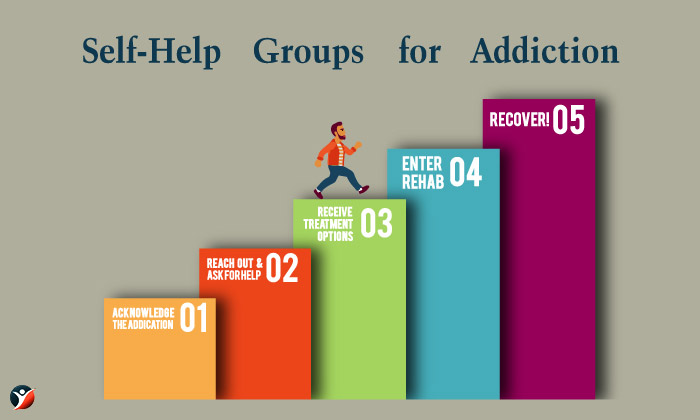
A patient can join a self-help group during the treatment and while recovering from the addiction. Within a self-help group, a recovering addict gets an opportunity to meet people with similar problems.
It acts as a wonderful platform of information and education of the patient, where he/she can share, discuss, and raise questions about his/her condition and getting best possible solutions to cope with the same in a relatively informal setting.
Self-help support groups like Narcotics Anonymous and Alcoholics Anonymous are widely known to remarkably lessen the likelihood of relapses and help people maintain long-term sobriety after the treatment.
Conclusion
Addiction can be either behavioral or substance related. It is much severe than a mere dependence. The alarming global addiction statistics are not at all impressive, and demand immediate attention to increase public awareness, especially among the youth to discourage certain addictive behaviors and substance use.
Be it behavioral or substance-related, addiction not only inflicts severe damage on the addicts in terms of work productivity, relationships and socioeconomic status, but severely affects the people around them.
Thankfully, several effective treatment approaches are available today to overcome addiction and safely survive through the demanding phase of withdrawal. Depending on the type and intensity of addiction, inpatient or outpatient treatment choices can be made.
Detox, which may include several medications, can be suggested to overcome the withdrawal symptoms during addiction treatment and recovery. Besides, a few psychotherapies are also known to be highly effective in helping an addict control compulsive behavior or overcome dependence on a drug.
To recovering addict, self-help or support groups offers a great platform to share one’s experience and seek help from people with similar problems within the group. Nevertheless, strong determination to stick to the treatment regimen and willingness to get rid of the dependency is crucial to the success of any addiction treatment program.

